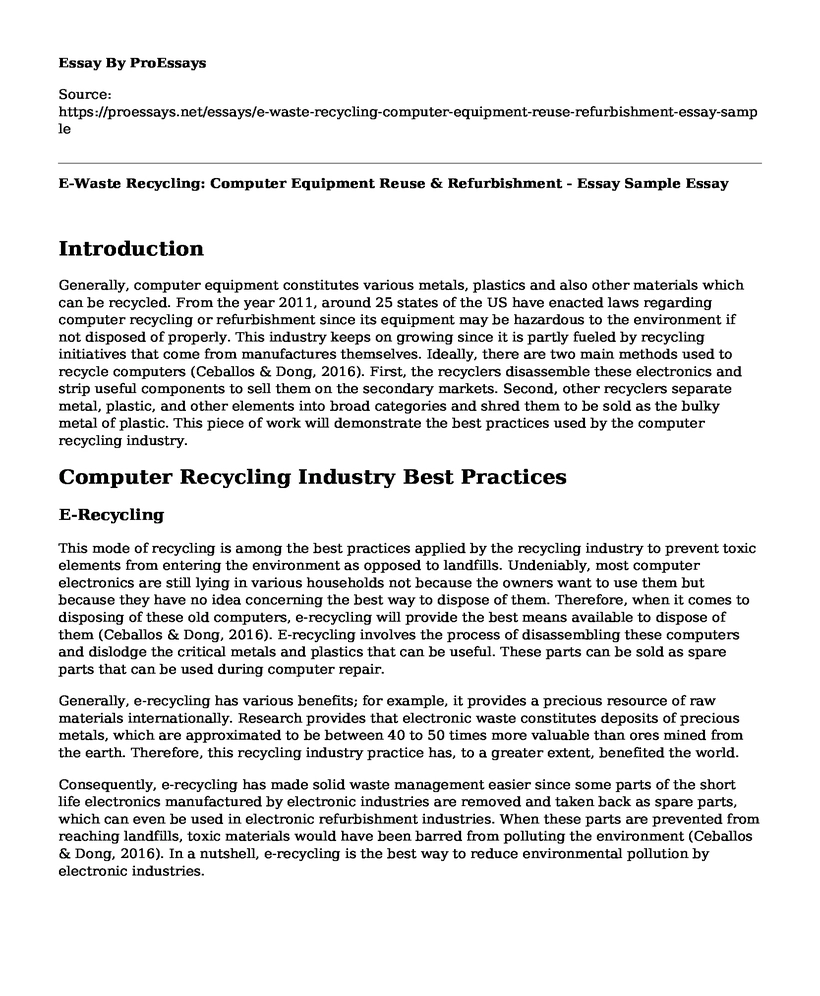Introduction
Generally, computer equipment constitutes various metals, plastics and also other materials which can be recycled. From the year 2011, around 25 states of the US have enacted laws regarding computer recycling or refurbishment since its equipment may be hazardous to the environment if not disposed of properly. This industry keeps on growing since it is partly fueled by recycling initiatives that come from manufactures themselves. Ideally, there are two main methods used to recycle computers (Ceballos & Dong, 2016). First, the recyclers disassemble these electronics and strip useful components to sell them on the secondary markets. Second, other recyclers separate metal, plastic, and other elements into broad categories and shred them to be sold as the bulky metal of plastic. This piece of work will demonstrate the best practices used by the computer recycling industry.
Computer Recycling Industry Best Practices
E-Recycling
This mode of recycling is among the best practices applied by the recycling industry to prevent toxic elements from entering the environment as opposed to landfills. Undeniably, most computer electronics are still lying in various households not because the owners want to use them but because they have no idea concerning the best way to dispose of them. Therefore, when it comes to disposing of these old computers, e-recycling will provide the best means available to dispose of them (Ceballos & Dong, 2016). E-recycling involves the process of disassembling these computers and dislodge the critical metals and plastics that can be useful. These parts can be sold as spare parts that can be used during computer repair.
Generally, e-recycling has various benefits; for example, it provides a precious resource of raw materials internationally. Research provides that electronic waste constitutes deposits of precious metals, which are approximated to be between 40 to 50 times more valuable than ores mined from the earth. Therefore, this recycling industry practice has, to a greater extent, benefited the world.
Consequently, e-recycling has made solid waste management easier since some parts of the short life electronics manufactured by electronic industries are removed and taken back as spare parts, which can even be used in electronic refurbishment industries. When these parts are prevented from reaching landfills, toxic materials would have been barred from polluting the environment (Ceballos & Dong, 2016). In a nutshell, e-recycling is the best way to reduce environmental pollution by electronic industries.
Manufacturer Programs
The manufacturers have also come up with recycling programs as a way to abide by the state regulations that demand manufacturers to cover the costs of recycling. A number of these programs are free, requiring only that the customers ship or rather drop off their devices for processing. Some manufactures give financial incentives to customers, paying them based on estimates of the amount that can be recovered from the make and the device recycled. On the other hand, manufacturers who don't conduct a recycling program frequently sponsor electronic recycling pans to meet state regulations requirements (Suresh, Bonda, Mohanty & Nayak, 2018). Therefore, the fact that manufacturers have devised methods of recycling the outdated computers, it acts as some of the essential practices that manufacturers have put in place to safeguard the environment from toxic elements these gadgets may emit when disposed of in landfills.
Conclusion
Generally, electronics, for instance, computers will continue to be manufactured, disposed, and recycled. However, it is vital to consider their side effects, mainly when eliminated. The above information has deeply provided that if theses electronics are not disposed of properly, they may be dangerous to the environment. Therefore, it is important to recycle them appropriately to safeguard the toxic elements they may emit to the environment.
References
Ceballos, D. M., & Dong, Z. (2016). The formal electronic recycling industry: challenges and opportunities in occupational and environmental health research. Environment international, 95, 157-166.
Suresh, S. S., Bonda, S., Mohanty, S., & Nayak, S. K. (2018). A review on computer waste with its special insight to toxic elements, segregation and recycling techniques. Process Safety and Environmental Protection, 116, 477-493.
Cite this page
E-Waste Recycling: Computer Equipment Reuse & Refurbishment - Essay Sample. (2023, Apr 19). Retrieved from https://proessays.net/essays/e-waste-recycling-computer-equipment-reuse-refurbishment-essay-sample
If you are the original author of this essay and no longer wish to have it published on the ProEssays website, please click below to request its removal:
- Case Study E-Waste Paper Example
- Detriments of Nuclear Energy in Light of the Fukushima Disaster Essay
- Environmental Issues Essay Example
- California's Water - Essay Sample
- Paper Example on ISO 14001: Reducing Impact on Environment
- Nuclear Disaster in Japan: Ethical Dilemmas & Global Impacts - Essay Sample
- Paper Sample on Wildfires: A Historical and Evolutionary Perspective







